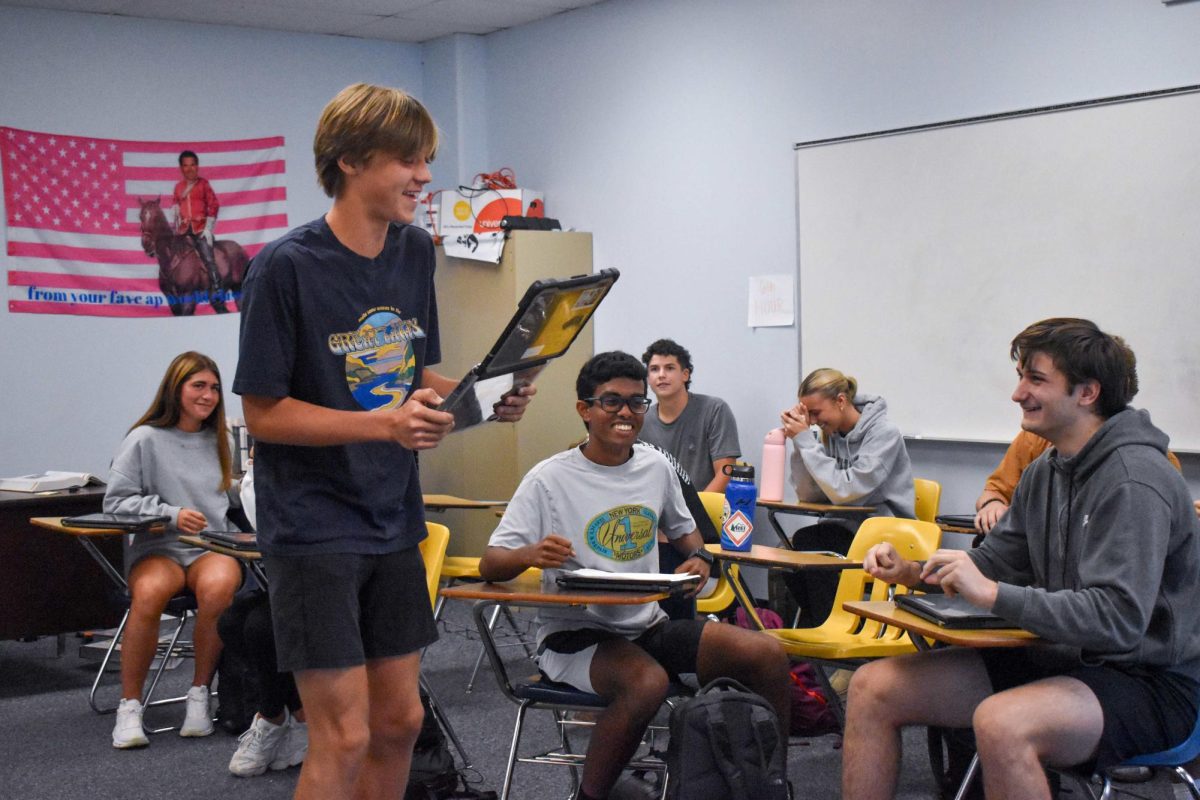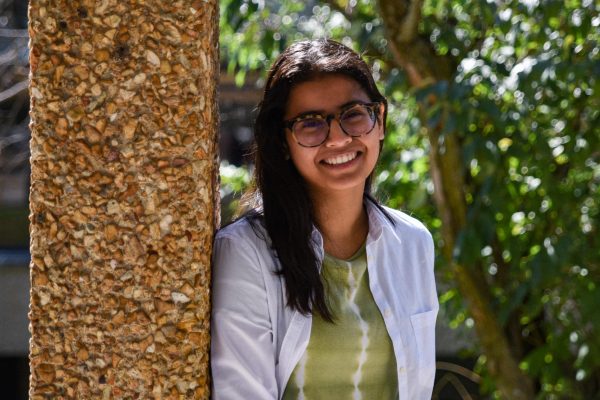When she was nine months old, junior Amelia Geistler flew across the Pacific Ocean to her new home in St. Louis. Originally born in China, Geistler was abandoned close to a fire station in the rural Chinese province of Jiangxi before a local adoption agency found her. Geistler‚Äôs parents ‚Äî after years of rigorous legal processing and screening through the Children‚Äôs Hope program ‚Äî met Geistler on June 25, 2007, labeled her ‚ÄúGotcha day,‚Äù and brought her home.¬Ý
Geistler’s story isn’t unusual, especially for female infants in China. Since the implementation of the one-child policy, millions of female babies have been abandoned or selectively aborted due to the patriarchal preference of sons over daughters. Over 30 million “missing girls” have been aborted in the womb or killed after birth due to the stringent one-child policy and perennial cultural beliefs.
‚ÄúI‚Äôm grateful for the life I was given here in America, where I have the opportunity to go to college and further my education. If I was still in China as an orphan, I‚Äôd probably have to work in a factory and would never [be able to] reach my potential. I‚Äôm grateful for a roof over my head and food I can eat,‚Äù Geistler said.¬Ý
However, Geisler‚Äôs life as an adoptee isn‚Äôt all sunshine and rainbows. Children of transracial adoptions often struggle to cope with identity, discrimination and bias ‚Äî¬Ý a side effect that Geistler has experienced throughout her life.¬Ý
“The best way I can describe being adopted is how society treats [biracial children], but slightly worse. I am adopted by white people as a Chinese adoptee, so when I face racism, I can’t go to my parents for comfort because they don’t understand what I go through as an Asian,” Geistler said. “My parents usually say ‘we don’t see color’ or ‘we don’t think of you as being adopted,’ which I know comes from the right place, but it feels like they invalidate what I have to go through.”
Over 40% of all adoptions are transracial with adoptees mainly from Asia, Latin America and Africa, while 73% of all parents that adopt are white. This causes some of the most marginalized groups in society, who are often alienated or coerced to desert their native cultures, to be set up with white families.¬Ý
‚ÄúI‚Äôm not as in touch with my Chinese roots as I‚Äôd like to be, but I used to truly be the definition of ‚Äòwhitewashed‚Äô with bleached hair, a dark tan, crop tops [and] scrunchies. I truly didn‚Äôt mind [that] until COVID-19 and the spike of hate crimes against Chinese people and Asian people in general. No matter how ‚Äòwhitewashed‚Äô I was, I still felt unsafe because I couldn‚Äôt change how I actually looked,‚Äù Geistler said.¬Ý
Hate crimes against Asian Americans, such as physical assault and verbal abuse motivated by one‚Äôs race, rose about 76% during the pandemic.¬Ý To put this into perspective, more than a third of all Asian Americans in the U.S. know another Asian American who has been threatened or attacked due to their race.
“I struggled a lot with my identity all throughout COVID-19 and had an identity crisis. I became mute because I felt [like] whatever I said had to represent my white side,” Geistler said. “The only times I felt safe was when I was with my white friends or parents.”
To reconnect with her native culture, Geistler plans to participate in CIEE’s study abroad program to study Mandarin in Shanghai and stay with a homestead family.
“My dad was the one who originally came to me with this study abroad opportunity because he knew how much I’ve struggled and wanted this chance to find myself. He knew this meant the world to me and he would never want me to lose it because of his worry. He’s my biggest supporter when it comes to me talking and wanting to learn about Chinese culture,” Geistler said. “I finally had come to terms that I was raised by white people and decided that I would start learning about the culture that I was born in before I moved to America. I plan to become fully immersed in Chinese culture so I don’t have to fit out anymore.”
While she is in China for her study abroad, Geistler will be taking a DNA test to find her birth parents and connect with any blood relatives. However, she intends to focus on learning more about her culture first during her trip.
‚ÄúI personally dislike being adopted but it‚Äôs hard to hate it because it gave me the life and opportunity I have now,‚Äù Geistler said. ‚ÄúI may not love my family at times but they have given me a life I could never not appreciate. Their adoption is why I want to pursue a career that will better lives around the world. At the end of the day, I wish people knew that [family is] different for everyone.¬Ý Everyone should [be] empath[etic] when needed and not joke [or] assume things about someone.‚Äù

![Junior Amelia Geistler poses with her aunt, uncle and cousin. Moving through childhood, Geistler learned that having parents with a different appearance from her meant facing awkward, upsetting situations. “Something I faced [after] being adopted was that I was [treated] better when people discovered I had white parents. A childhood memory [is] when I went over to a friend's house for the first time and her parents seemed to be very passive-aggressive, but when they learned I was adopted by white parents, they gave me equal treatment and ‘love’ as their white daughter,” Geistler said.](https://pwestpathfinder.com/wp-content/uploads/2024/04/Screenshot-2024-04-30-7.54.03-AM.png)


![Freshman Daphne Stokes looks at a table with Veterans Day flyers and information on Nov. 11. Stokes, along with other West High students, like senior Alexander Lewinski, passed by the table in the cafeteria with army recruitment information and giveaways for students to observe during lunch. “Talking with [the recruiters] has definitely helped me [find] where I wanted to go, more than anything else,” Lewinski said.](https://pwestpathfinder.com/wp-content/uploads/2025/11/DSC_1227-2-1200x800.jpg)
![Helping a customer, print room assistant Gretchen Williams operates her booth at the West High Craft Fair from Oct. 25-26. This was Williams’ first time participating in the Craft Fair with her new craft shop, Gs Beaded Boutique. “People have always said, over the years, ‘you should open something.’ [I replied that] I would rather just make [my crafts as] gifts for people. I just started [the online store] up, and it's been okay. I'm always surprised [by] how many views I get and [the] people from different states buying things; somebody from Alaska bought something the other day.”](https://pwestpathfinder.com/wp-content/uploads/2025/11/DSC0451-2-1200x799.jpg)
![Gesturing toward the club’s name on the board, Global Youth Aid co-president year Daniah Alsagheer discusses upcoming service projects with members during a meeting on Oct. 30. “We might be one club at one school, but together, we’re [part of] something much bigger,” Alsagheer said.](https://pwestpathfinder.com/wp-content/uploads/2025/11/DSC00949-1200x800.jpg)
![Focused on providing exceptional service, sophomore Darsh Mahapatra carefully cleans the door of a customer’s car. Mahapatra has always believed his customers deserve nothing less than the best. “[If] they’re trusting us with their car and our service, then I am convinced that they deserve our 100 percent effort and beyond,” Mahapatra said.](https://pwestpathfinder.com/wp-content/uploads/2025/10/DSC_0018-1200x800.jpg)
![Sophomore Aleix Pi de Cabanyes Navarro (left) finishes up a soccer game while junior Ava Muench (right) warms up for cross country practice. The two came to Parkway West High School as exchange students for the 2025-2026 school year. “The goal for the [exchange] program is to provide opportunities for both Parkway students and our international exchange students to learn about other cultures, build connections and become confident, capable, curious and caring — Parkway’s Four C’s — in the process,” Exchange Program Lead Lauren Farrelly said.](https://pwestpathfinder.com/wp-content/uploads/2025/10/Feature-Photo-1200x800.png)

![Gazing across the stage, sophomore Alexis Monteleone performs in the school theater. The Monteleone family’s band “Monte and the Machine” has been releasing music since 2012, but Alexis started her own solo career in 2024 with the release of her first single, Crying Skies. “My whole family is very musical, [and I especially] love writing [songs with them],” Monteleone said.](https://pwestpathfinder.com/wp-content/uploads/2025/09/DSC7463-1200x798.jpg)
![Amid teaching a lesson to her AP Calculus BC class, Kristin Judd jokes alongside her students in their funny remarks. Judd has always enjoyed keeping the mood light in her classroom, along with on the volleyball court. “[I enjoy] that side talk where you see [or] overhear a conversation and chime in, or somebody says something funny,” Judd said.](https://pwestpathfinder.com/wp-content/uploads/2025/09/image-1200x730.jpg)
![Eyeing the ball, junior Ella McNeal poses for her commitment pictures at Clemson University. McNeal’s commitment comes after months of contact with top Division 1 soccer programs. “ It has taken a lot to get to where I am, but I know that [what] I've already been through is just the beginning, and I can't wait for what is to come,” McNeal said.](https://pwestpathfinder.com/wp-content/uploads/2025/09/IMG_4926-1200x900.jpeg)
